John Wilkins (1614-1672) : 1638,
: 1638,
 : 1638,
: 1638, Ou un discours tendant à prouver qu'il est probable qu'il puisse y avoir un autre monde habitable dans cette planète
par John Wilkins
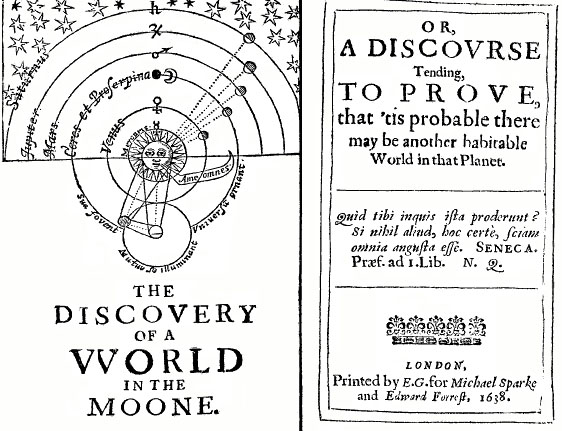
Si parmi vos heures de loisirs vous pouvez en consacrer certaines à la lecture de ce discours, et cherchez à y trouver quelque chose qui puisse y servir for thy information and benefit : laissez-moi alors conseiller ceux qui y viennent avec un esprit égal, non swayed by prejudice, mais indifferently resolved to assent unto that truth which upon deliberation shall seeme most probable unto thy reason, and then I doubt not, but either thou wilt agree with mee in this assertion, or at least not thinke it to be as farre from truth, as it is from common opinion.
Il y a ici 2 avertissements que je souhaiterais admonester thee of dès le début :
De nombreux anciens Philosophes of the better note, ont auparavant défendu l'assertion, que j'ai laid downe, et it were to be wished, que certains d'entre nous would more apply our endeavours unto the examination of these old opinions, which though they have for a long time lien neglected by others, yet in them may you finde many truths well worthy your paines and observation. C'est une fausse idée pour nous de penser que parmi l'ancienne variété et la recherche d'opinions, le meilleur hath a toujours prévalu. Le temps (saith the learned Verulam [Francis Bacon]) semble avoir la nature d'une rivière ou d'un flux, qui carrieth downe to us that which is light, or blowne up, but sinketh that which is weighty and solid.
Il est de mon désir par l'occasion de ce discours, I may raise up some more active spirit to a search after other hidden and unknowne truthes. Since it must needes be a great impediment unto the growth of sciences, for men still so to plod on upon beaten principles, as to be afraid of entertaining any thing that may seeme to contradict them. An unwillingnesse to take such things into examinaton, is one of those errours of learning in these times observed by the judicious Verulam. Questionlesse there are many secret truths, which the ancients have passed over, that are yet left to make some of our age famous for their discovery.
If by this occasion I may provoke any reader to an attempt of this nature, I shall then thinke my selfe happy, and this worke successefull.
Adieu.
Que l'étrangeté de cette opinion n'est pas une raison suffisante pour qu'elle soit rejetée, parce que d'autres vérités certaines ont auparavant été estimées ridicules, et de grandes absurdités entretenues par le consentement commun.
Je dois confesser, bien que j'aie souvent pensé en moi-même qu'il était possible qu'il puisse y avoir un monde dans
la Lune, yet it seemed such an uncouth opinion
that I never durst discover it, par peur d'être qualifié de singular et ridicule, mais après avoir lu Plutarque, Galilée ,
Kepler
,
Kepler , et d'autres, et avoir trouvé nombre de mes propres pensées confirmées par une autorité aussi forte,
j'ai alors conclu qu'il n'était pas seulement possible qu'il puisse y avoir, mais probable qu'il y ait un autre
monde habitable dans cette planète.
, et d'autres, et avoir trouvé nombre de mes propres pensées confirmées par une autorité aussi forte,
j'ai alors conclu qu'il n'était pas seulement possible qu'il puisse y avoir, mais probable qu'il y ait un autre
monde habitable dans cette planète.
Dans la prosecuting de cette assertion, je m'efforcerai d'abord to cleare the way from such doubts as may hinder the speed or ease of farther progresse; and because the suppositions imply'd in this opinion may seeme to contradict the principles of reason or faith, it will be requisite that I first remove this scruple, shewing the conformity of them to both these, and proving those truths that may make way for the rest....
Qu'une pluralité des mondes ne contredit aucun principle de la raison ou de la foi.
Que les cieux ne consistent pas en une quelconque matière si pure qu'elle puisse les privilégier d'un changement ou d'une corruption semblable à ce à quoi les corps inférieurs peuvent être exposés.
Que la Lune est un corps solide, compact et opaque.
Que la Lune n'a aucune lumière propre.
Qu'il existe un monde sur la Lune, a été l'opinion directe de nombreux anciens, ainsi que de Mathématiciens modernes, et pourrait probablement être déduit des tenents [tenets] d'autres.
Que ces points et parties plus claires qui peuvent être distingués par notre vue dans la Lune, montrent les différences entre la Mer et le Terre dans cet autre Monde.
Les points représentent la mer, et les parties plus claires la Terre.
Puisque [la Lune] moves so swiftly as Astronomers observe, why then does there nothing fall from her, or why doth shee not shake something out by the celerity [speed] of her revolution?
I answer, you must know that the inclination of every heavie body, to its proper Center doth sufficiently tie it unto its place, so that suppose any thing were separated, yet must it necessarily returne again, and there is no more danger of their falling into our world then there is feare of our falling into the Moone....
But it may be againe objected, suppose there were a bullet shot up in that world, would not the Moone runne away from it, before it could fall downe, since the motion of her body (being every day round our earth) is farre swifter than the other, and so the bullet must be left behinde, and at length fall downe to us?
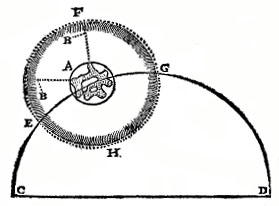
To this I answer,
That I may the plainer expresse my meaning, I will set downe this Diagramme.
Suppose this earth were A, which was to move in the circle CD, and let the bullet be supposed at B within its proper verge [boundaries]; I say, whether this earth did stand stil or move swiftly towards D, yet the bullet would still keepe at the same distance by reason of that Magneticke vertue of the center (if I may so speake) whereby all things within its spheare are attracted with it.
Qu'il existe de hautes montagnes, des vallées profondes et des plaines spacieuses dans le corps de la Lune.
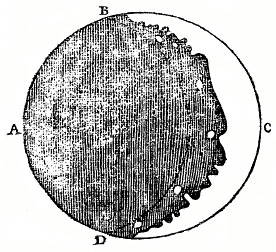
I shall ... produce the eyewitnesse of Galilée , on which I most of all depend for the
proofe of this Proposition, when he beheld the new Moone through his perspective [telescope], it appeared to him
under a rugged and spotted figure, seeming to have the darker and enlightned parts divided by a tortuous line,
having some parcels of light at a good distance from the other, and this difference is so remarkable, that you may
easily perceive it through one of those ordinary perspectives [telescopes], which are commonly sold amongst us, but
for your better apprehending of what I deliver, I will set downe the Figure as I finde it in Galilée
, on which I most of all depend for the
proofe of this Proposition, when he beheld the new Moone through his perspective [telescope], it appeared to him
under a rugged and spotted figure, seeming to have the darker and enlightned parts divided by a tortuous line,
having some parcels of light at a good distance from the other, and this difference is so remarkable, that you may
easily perceive it through one of those ordinary perspectives [telescopes], which are commonly sold amongst us, but
for your better apprehending of what I deliver, I will set downe the Figure as I finde it in Galilée :
:
...J'affirme qu'il y a de très hautes montagnes dans la Lune. Kepler et Galilée pensent qu'elles sont plus
hautes que n'importe laquelle sur notre Terre. Mais je ne suis pas de leur opinion là-dessus,
parce que je suppose they goe upon a false ground whilst they conceive that the highest mountaine upon the earth is
not above a mile [1600 m] perpendiculaire.
pensent qu'elles sont plus
hautes que n'importe laquelle sur notre Terre. Mais je ne suis pas de leur opinion là-dessus,
parce que je suppose they goe upon a false ground whilst they conceive that the highest mountaine upon the earth is
not above a mile [1600 m] perpendiculaire.
Whereas 'tis the common opinion and found true enough by observation, that Olympus [2917 m], Atlas [probablement Jebel Musa (846 m) en Espagne, un promontoire sur la côte nord de l'Afrique qui, avec le Rocher de Gibraltar, forme les Colonnes d'Hercules fabulées], Taurus [ils y a plusieurs hauts pics dans la chaîne de Toros Daglari de la Turquie : Erciyes Dagi (3916 m), Demirkazik (3756 m) et Kizilkaya (3725 m)] et Emus[?], with many others are much above this height. Tenariffa [Mount Teide (3718 m)] in the Canary Islands is proved by computation to bee above 8 miles perpendicular, and about this height is the mount Perjacaca [probably Guyana's Mt. Roraima (2772 m)] en Amerique. Sr. Walter Rawleigh seems to thinke, that the highest of these is neere 30 miles upright: nay Aristotle speaking of Caucasus [probablement le Mt. Elbrus (5642 m) situé en Russie juste au nord de la frontière Georgienne] en Asie, affirmes it to bee visible for 560 miles, as some interpreters finde by computation, from which it will follow, that it was 78 miles perpendicularly high...
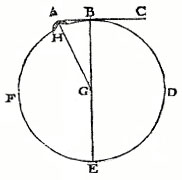
I shall prove from the observation of Galilæus, whose glasse can shew this truth to the senses, a proofe beyond exception and certaine that man must needs be of a most timerous faith who dares not believe his owne eye.
By that perspective you may plainely discerne some enlightened parts (which are the mountaines) to be distant from the other about the twentieth part of the diameter. From whence it will follow, that those mountaines must necessarily be at the least foure Italian miles in height.
Qu'il existe une atmosphère, ou un orbe de gros air vaporeux, entourant de manière immediate le corps de la Lune.
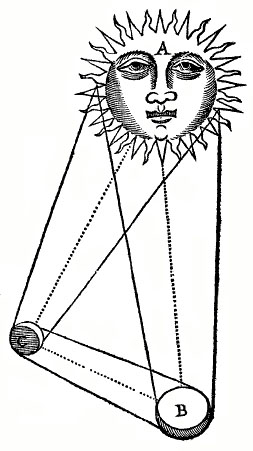
Que puisque leur monde est notre Lune, alors notre monde est leur Lune.
La manière of [the] mutual illumination betwixt [the earth and the moon] you may plainly discerne in this Figure following.
Where A represents the Sun, B the Earth, and C the Moone; Now suppose the Moone C to be in a sextile of increase, when there is onely one small part of her body enlightened, then the earth B will have such a part of its visible Hemispheare darkened, as is proportionable to that part of the Moone which is enlightened; and as for so much of the Moone, as the Sun beames cannot reach unto, it receives light from a proportionall part of the earth which shines upon it, as you may plainly perceive by the Figure....
Perhaps there may be some other enlightened body above the Moone which we cannot discerne, nor is this altogether improbable because there is almost the like observed in Saturne, who appears through this glasse with two lesser bodies on each side, which may supply the office of Moones, unto each hemispheare thus:

So in this world also there may be some such body, though wee cannot discerne it, because the Moone is alwaies in a streight line, betwixt our eye and that. Nor is it altogether unlikely that there shoul.d bee more moones to one Orbe, because Jupiter also is observed to have foure such bodies that move round about him.
Qu'il est probable qu'il puisse y avoir des Météores appartenant à ce monde dans la Lune, et qu'ils soient avec nous.
Qu'il est probables qu'il puisse y avoir des habitants dans cet autre monde, mais que leur type est incertain.
...I dare not my selfe affirme any thing of these Selenites, because I know not any ground whereon to build any probable opinion. But I thinke that future ages will discover more; and our posterity, perhaps, may invent some meanes for our better acquaintance with these inhabitants. 'Tis the method of providence not presently to shew us all, but to lead us along from the knowledge of one thing to another.
Twas a great while ere the Planets were distinguished from the fixed Stars, and sometime after that ere the morning and evening starre were found to bee the same, and in greater space I doubt not but this also, and farre greater mysteries will be discovered.
In the first ages of the world the Islanders either thought themselves to be the onely dwellers upon the earth, or else if there were any other, yet they could not possibly conceive how they might have any commerce with them, being severed by the deepe and broad Sea, but the after-times found out the invention of ships, in which notwithstanding none but some bold daring men durst venture, there being few so resolute as to commit themselves unto the vaste Ocean, and yet now how easie a thing is this, even to a timorous & cowardly nature?
So, perhaps, there may be some other means invented for a conveyance to the Moone, and though it may seeme a terrible and impossible thing ever to passe through the vaste spaces of the aire, yet no question there would bee some men who durst venture this as well as the other. True indeed, I cannot conceive any possible meanes for the like discovery of this conjecture, since there can bee no sailing to the Moone, unlesse that were true which the Poets doe but feigne, that shee made her bed in the Sea. We have not now any Drake or Columbus to undertake this voyage, or any Dædalus to invent a conveyance through the aire. However, I doubt not but that time who is still the father of new truths, and hath revealed unto us many things which our Ancestours were ignorant of, will also manifest to our posterity, that which wee now desire, but cannot know....
Time will come when the indeavours of after-ages shall bring such things to light, as now lie hid in obscurity. Arts are not yet come to their Solstice, but the industry of future times assisted with the labours of their forefathers, may reach unto that height which wee could not attaine to.
As wee now wonder at the blindnesse of our Ancestors, who were not able to discerne such things as seeme plaine and obvious unto us. So will our posterity admire our ignorance in as perspicuous matters. Keplar doubts not, but that as soone as the art of flying is found out, some of their Nation will make one of the first colonies that shall inhabite that other world. But I leave this and the like conjectures to the fancie of the reader; Desiring now to finish this Discourse, wherein I have in some measure proved what at the first I promised, a world in the Moone. However, I am not so resolute in this, that I thinke tis necessary there must be one but my opinion is that 'tis possible there may be, and tis probable there is another habitable world in that Planet. And this was that I undertooke to prove. In the pursuit whereof, if I have shewed much weaknesse or indiscretion; I shall willingly submit my selfe to the reason and censure of the more judicious.